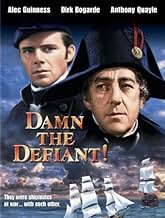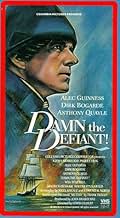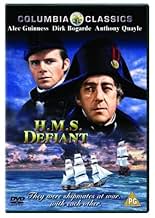Agrega una trama en tu idiomaOn the H.M.S. Defiant, during the French Revolutionary War, fair Captain Crawford is locked in a battle of wills against his cruel second-in-command Lieutenant Scott-Padget, whose heavy-hand... Leer todoOn the H.M.S. Defiant, during the French Revolutionary War, fair Captain Crawford is locked in a battle of wills against his cruel second-in-command Lieutenant Scott-Padget, whose heavy-handed command style pushes the crew to mutiny.On the H.M.S. Defiant, during the French Revolutionary War, fair Captain Crawford is locked in a battle of wills against his cruel second-in-command Lieutenant Scott-Padget, whose heavy-handed command style pushes the crew to mutiny.
- Dirección
- Guionistas
- Elenco
- Dirección
- Guionistas
- Todo el elenco y el equipo
- Producción, taquilla y más en IMDbPro
Opiniones destacadas
Lewis Gilbert may just be one of Britain's most undervalued versatile directors. Here's a man that has directed Educating Rita/The Admirable Crichton (comedy), The Good Die Young (crime), Cast a Dark Shadow (Noir), Reach for the Sky (biography), Alfie/Shirley Valentine (romance), James Bond x 3 (multi genre) and sea faring adventures such as Sink the Bismarck! and this fine Napoleonic historical piece, H.M.S. Defiant.
Adapted from Frank Tilsley's novel "Mutiny", this is a film built around a true story about what became known as the "Spithead" and "Nore" mutinies in 1797. Where sailors and press ganged inlanders were fed up with the working conditions, rates of pay and the all round treatment from the officers in charge. Also into the mix is a fascinating battle of wills between the two leaders of the Defiant, both men, in the midst of their power struggle, are oblivious to the rumblings and plotting of the crew. I mean you would think that with the French warships possibly around the corner that they would be unified in creating a rock solid front? That they don't gives the film an extra dimension. Thus when the battle sequences do come, and the turn of events perk the piece up, it has a two fold impact that makes all the waters lead to a terrific foggy bound climax.
The cast are notable names from a roll call of British performers. Alec Guinness as Captain Crawford plays it spot on. An honourable man adhering to his code of ethics, it's through a plot strand involving his own son being on board that Crawford gets torturous and conflicted by his emotions. Who better than Guinness to layer such a role? Dirk Bogarde steps up to play weasel duties as Lieut. Scott-Padget, suitably handsome in uniform but playing the devils tricks, it begs the question on why Bogarde didn't in fact play more villains? because here he is excellent at it. Leading the mutiny is the looming muscular presence of Anthony Quayle, who along with Nigel Stock leaves a favourable mark in the support cast.
Comparisons with other notable genre entries are inevitable, the likes of Mutiny On the Bounty, Captain Horatio Hornblower R.N. and the more modern offering that is Master and Commander: The Far Side of the World. If you like any of those films then the chances are you are bound to get much from this British production. The ocean scenes are filmed out in Alicante, and they sparkle as a backdrop to the splendid costumes, while the ships design is top draw. Ultimately this a fine genre entry, for as it stirs the blood and tells a great multi stranded story, it's also acted quite superbly by the cast. 8/10
Denis Maternovsky
I think Alec Guinness is the only actor who can portray a character who is colorless yet also make him sympathetic. Perhaps the World War II era (with its emphasis on teamwork, its glorification of the average G.I., and its near-worship of able, but dull, leaders like Omar Bradley) may have influenced it, because the movie strongly emphasizes the worth of the common man, especially as personified by Anthony Quayle's character.
It's an offbeat movie: part sea adventure, part character drama, part historical epic. Critics might say it's not satisfactory in any of these areas, but those of us who love it recognize how special and even unique it is. Now that Columbia has finally released on DVD a letter-boxed version one can fully appreciate its worth, not only for the sea battle scenes, but also the many two-shots of Guinness and Bogarde interacting (or, more often, snarling) at each other.
The mutiny on the Bounty is the one that most people think of whenever they hear the word "mutiny". Otherwise they think of THE CAINE MUTINY. Actually there have been many mutinies. In 1905 a mutiny on the Russian battleship Potemkin occurred at Odessa on the Black Sea. It was immortalized by Serge Eisenstein in his film of the name POTEMKIN.
It surprises many people outside of England that the Bounty was peanuts compared to the Great Mutiny of 1797 at the Nore and Spithead of the entire British fleet (also the 1931 Invergordon Mutiny of the British fleet during the depression, which was a total surprise). The Great Mutiny is supreme because it occurred just when England was facing revolutionary France in the French Revolutionary Wars. A force being planned by Wolfe Tone and the French General Lazare Hoche was to invade Ireland. By sheer chance the French were unable to take advantage of the moment of England's peril to invade.
The 1797 Mutiny at Spithead was actually successful - various gains in pay and food were made by the sailors. Then came the Nore Mutiny, which was led by a seaman of some leadership qualities named Richard Parker. Parker's demands were impossible, and he apparently toyed with leading the fleet to France. Instead the British Admiralty got tough, and crushed the mutiny. Ironically one of the last ships to give up was H.M.S. Director, which was commanded by William Bligh. It was the second mutiny (of three!) that Bligh would face in his career. Parker was tried for mutiny and executed, as were dozens of other sailors.
It would be nice if some enterprising producer would make an accurate film of the 1797 Mutiny - but until that day comes we are left with two films that roughly approximate the story. There is Peter Ustinov's BILLY BUDD, which is set in the period of the Great Mutiny, and this one. BILLY BUDD has much going for it regarding it's source material (Herman Melville's brilliant study of good and evil, and how they are impossible to separate). Then there is DAMN THE DEFIANT / H.M.S. DEFIANT, which tells the story from the point of view of a single vessel and the evils that permeated all the crew from the Captain to the tars.
Alec Guinness is a well meaning but weak leader who is the Captain of Defiant, and has been stuck with Dirk Bogarde as his new second in command, a socially well-connected sadist. Bogarde is determined to be the real commander of the ship, and is willing to do what is needed to bring Guinness and everyone in sight under heal. Guinness's son is a midshipman on the DEFIANT, and Bogarde keeps finding ways of punishing the young man that Guinness (because of fears of favoritism) will not interfere with. On top of this, during one battle, Guinness loses an arm (a salute to Lord Nelson who was similarly was crippled).
However, the men led by Anthony Quayle, decide to join the mutiny. And then it is Bogarde's turn to sweat.
What were the gripes of the mutineers? Low pay (the government spent money on bribes for votes, but not decent pay). Nothing like pensions for the men - frequently kidnapped by press gangs in the major cities - and left cripples after serving in the naval battles. Food was crap - the quartermasters and the people who sold supplies were in cahoots and sold rotten food to the ships. It was a "lovely life". The wonder is that there weren't more bloodbath mutinies. One (in 1798) on board H.M.S. Hermoine led to the murder of a dozen officers, including the Captain (one Hugh Pigott). Reading of it makes one realize how lucky Bligh and the Admirals were that they did not face the real wrath that was just under the surface.
¿Sabías que…?
- TriviaSir Alec Guinness and Sir Anthony Quayle made this movie during the two-month break in the shooting of Lawrence de Arabia (1962), when the production moved from Jordan to Spain. Upon finishing this movie, both returned to Lawrence of Arabia (1962).
- ErroresIn the last scene, Sir Alec Guinness orders all larboard (port side) guns to bear on the fire ship. In the next shot, the starboard cannon fire. Ironically, the term "larboard" was changed by the navy into the current term "port" precisely because it was too easy to mistake it for starboard.
- Citas
Lieut. Scott-Padget: [Scott-Padget turns back to the Captain as he begins to exit] You may have the power of life and death over every man about this ship, sir, but I warn you: if we come through this voyage safely...
Captain Crawford: [Crawford looks up from his work] Yes? If?
Lieut. Scott-Padget: To have followed Admiralty instructions may not be quite be enough.
Captain Crawford: [Crawford smacks his desk, jumps up and approaches Scott-Padget] I will say this to you only once, sir: I will not be bullied or threatened and I intend to be obeyed! Your friends in London mean nothing to me! I assure you that while you serve aboard this ship, they will mean absolutely nothing to you! You can go now.
- Créditos curiososOpening credits prologue: SPITHEAD, ENGLAND 1797
- ConexionesFeatured in Bequest to the Nation (1973)
Selecciones populares
- How long is Damn the Defiant!?Con tecnología de Alexa
Detalles
- Fecha de lanzamiento
- País de origen
- Idiomas
- También se conoce como
- Damn the Defiant!
- Locaciones de filmación
- Denia, Alicante, Comunidad Valenciana, España(Spanish coast)
- Productoras
- Ver más créditos de la compañía en IMDbPro
- Tiempo de ejecución1 hora 41 minutos
- Color
- Relación de aspecto
- 2.35 : 1
Contribuir a esta página



































